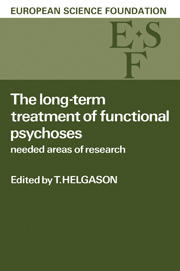Book contents
- Frontmatter
- Contents
- List of Participants
- Introduction
- I Organisational Aspects of Long-term Treatment
- II Patients Aspects of Long-term Treatment
- Needed are as of research in psychological treatments for functional psychoses
- Family therapy as part of the treatment of schizophrenia
- Milieu therapy in the long-term treatment offunctional psychoses: needed areas of research
- Long-term treatment of functional psychosis with neuroleptics
- Lithium and prophylaxis in manic-depressive illness
- New perspectives in psychopharmacology
- Research implications of recent trends in the treatment of schizophrenia
- Long-term treatment of functional psychoses in childhood and adolescence
- Functional psychosis in old age
- Chronicity and hospitalization: can the viciouscirclesbe broken?
- Social network and the long-term course of mental disorders - research needs
- III Public Health Aspectsof Long-term Treatment
- Index
Family therapy as part of the treatment of schizophrenia
from II - Patients Aspects of Long-term Treatment
- Frontmatter
- Contents
- List of Participants
- Introduction
- I Organisational Aspects of Long-term Treatment
- II Patients Aspects of Long-term Treatment
- Needed are as of research in psychological treatments for functional psychoses
- Family therapy as part of the treatment of schizophrenia
- Milieu therapy in the long-term treatment offunctional psychoses: needed areas of research
- Long-term treatment of functional psychosis with neuroleptics
- Lithium and prophylaxis in manic-depressive illness
- New perspectives in psychopharmacology
- Research implications of recent trends in the treatment of schizophrenia
- Long-term treatment of functional psychoses in childhood and adolescence
- Functional psychosis in old age
- Chronicity and hospitalization: can the viciouscirclesbe broken?
- Social network and the long-term course of mental disorders - research needs
- III Public Health Aspectsof Long-term Treatment
- Index
Summary
Need for comprehensive research approach to the treatment of schizophrenia
Schizophrenia treatment and research is hampered by a lack of integration of different conceptions as to the nature of the illness. Researchers have specialized in different fields, and even clinicians too often are restricted to a relatively narrow therapeutic orientation, with little knowledge of other approaches. We should, in my view, recognize the multidimensional nature of our task and aim at the further development of the treatment of schizophrenia; our approach should be integrated, but at the same time differentiated according to the individual case. I therefore consider it necessary to approach my own subject, research on family therapy, from a comprehensive viewpoint. The most important concepts of schizophrenia, and the treatment modes connected with them, are shown simplified in Fig. 1.
There is no need to consider in greater detail here the aetiological theories underlying these orientations. Instead I want to stress that each of these therapeutic approaches can be justified on the basis of research data; it has its own importance as a therapy, and its own limitations as well. Schizophrenic patients form a heterogeneous group in which therapeutic needs are individually weighted in different ways. This must be taken into account in planning the treatment in order to attain the best possible results (Alanen et al., 1982a).
In research work too, more attention should be paid to a multidimensional approach. One weakness which can be seen in many treatment studies is a certain methodological rigidity in the theoretical framework itself. A group of schizophrenics is selected on random grounds, to receive a specific form of treatment; this is administered in a rigidly schematic manner while other similar groups, selected as controls, receive different treatment or none at all. Such a research design does not lead to an adequate view of the possibilities of an individually planned psychotherapeutic treatment approach to schizophrenia (Alanen et al., 1980). It may be more meaningful to study what case-specific clinical, family dynamic and social-background variables should be taken as indications for a certain type of treatment, or for a treatment-mode combination weighted in a certain way. The indications of family-centred treatment modes should also be considered from such a comprehensive point of view, not as a treatment carried out separated from a more global treatment plan.
- Type
- Chapter
- Information
- The Long-Term Treatment of Functional PsychosesNeeded Areas of Research, pp. 77 - 88Publisher: Cambridge University PressPrint publication year: 1985

